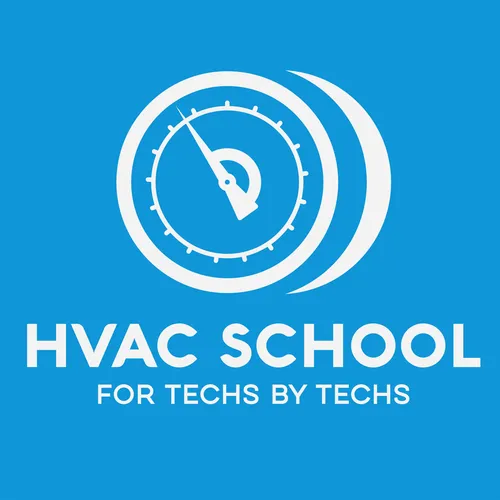
HVAC School - For Techs, By Techs
Real training for HVAC ( Heating, Ventilation, Air Conditioning and Refrigeration) Technicians. Including recorded tech training, interviews, diagnostics and general conversations about the trade.
- Update frequency
- every 3 days
- Average duration
- 34 minutes
- Episodes
- 838
- Years Active
- 2016 - 2025

Intro to Pneumatic Controls w/ Jim Loring
In today's podcast episode, Bryan talks to west-coast commercial tech Jim Loring about pneumatic controls and variable air volume (VAV) systems.
People sometimes confuse pneumatics and hydraulics. Hy…

Floating Suction and Head and Rack Refrigeration w/ Jeremy Smith
Jeremy Smith goes over floating suction and floating head refrigeration strategies. He also talks a bit more about low-ambient equipment operation.
Floating suction controls developed when we started…

Dehumidification Settings and Wiring with the Ecobee thermostat
Bryan talks with Jesse and Nathan about setting up dehumidification for residential equipment in general. They also discuss some of the required and recommended settings on an Ecobee thermostat.
On t…

What it Takes to be an Excellent Residential Service Tech
In this episode, we cover the skills and traits needed to be the best residential service techs you can be. We follow up on the last episode's tips for getting a raise and discuss how to become more …

Special Episode - How to Get a Raise, Promotion or Bonus
As we ring in the new year, this episode focuses on how people in the HVAC/R trade can get a raise, promotion, or bonus without facing rejection or sounding selfish.
Before you think about asking for…

Single Phase, 3 Phase, and Split Phase Explained
In this podcast episode, we discuss power distribution and some practical tips about three-phase, single-phase, and split-phase power.
The power company generates three-phase power; a power pole tran…

Desiccant Dehumidification w/ Tom Peterson
Learn about large-scale desiccant dehumidification from the expert, Tom Peterson. Tom works with CDI (Climate By Design International).
Dehumidification has several different methods and applications…

Compression Ratio, Heat Pumps and More w/ Carter Stanfield
Carter tells us why compression ratio is important, what it means, why it changes so much on heat pump systems, and the effect it has on system operation. We also talk a bit more about heat pumps and…

Using Volts and Ohms in Diagnosis
In today's podcast, Bryan talks about voltage (volts) and resistance (ohms), specifically using a voltmeter and an ohmmeter for diagnosis. We also discuss voltage drop.
In many cases, Ohm's law is im…

Variable Speed Motors and Why They Matter w/ Jamie Kitchen
Jamie Kitchen from Danfoss talks all about variable-speed motor technology. He discusses why those motors exist, what they do, and how to think differently about the future of HVAC/R.
Most techs thin…

Duct Design Facts w/ Jack Rise
Jack Rise returns to the podcast to share some duct design facts with us and talk about his Manual D book on the ACCA website.
Before we can even start thinking about duct design, we need to think ab…

Removing Gas Meters and Heat pumps in Cold Climates w/ Nate Adams
Nate Adams joins the podcast to describe the method behind his madness of removing gas meters and installing heat pumps in Ohio. Nate is in the home performance business, and he focuses on its inters…

Leak Free Systems w/ Bill Johnson
Bill Johnson is one of the great educators and writers of our time in HVAC/R. In this podcast episode, he shares some information about his career and some of his top tips on keeping systems leak-fre…

Furnaces - Introduction and History w/ Jim Bergmann
Jim takes us all the way through the history of furnaces, from the Stone Age when he was a child to modern modulating condensing types.
The goal of a furnace is to move heat, so a furnace uses heat e…

Electrical Circuits Class
This podcast episode on electrical circuits is a class recording. In it, Bryan discusses transformers, ground, common, and line vs. load sides of a circuit.
Transformers use induction to pass alterna…

Electrical Basics: How and Why Electrons Move
In HVAC work, we deal with quite a few electrical components. But where does electricity come from? Why do electrons move? In this podcast episode, we talk about differential charges, sine waves, and…

The Duct We Tend to Forget w/ Joe Medosch
Do you think of the building envelope as a duct? Do you test it? In this podcast episode, Joe Medosh talks to us about envelope testing and why it’s the future of building health and comfort.
The bui…

Ductless Maintenance Steps - Part 2
Ductless expert Jesse Claerbout talks about his best maintenance practices for ductless air conditioners and heat pumps. This episode is part 2 of the two-part series.
Ductless outdoor units tend to…

Ductless Maintenance Steps - Part 1
Ductless expert Jesse Claerbout talks about his best practices for maintaining ductless air conditioners and heat pumps. This episode is part 1 out of 2. Ductless maintenance can be a bit more extens…

Run Capacitor Facts You May Not Know
In this episode, we cover some common misconceptions about run capacitors, some easy ways to test them, and some tips on working with them.
A run capacitor is a power storage device; it contains oil …